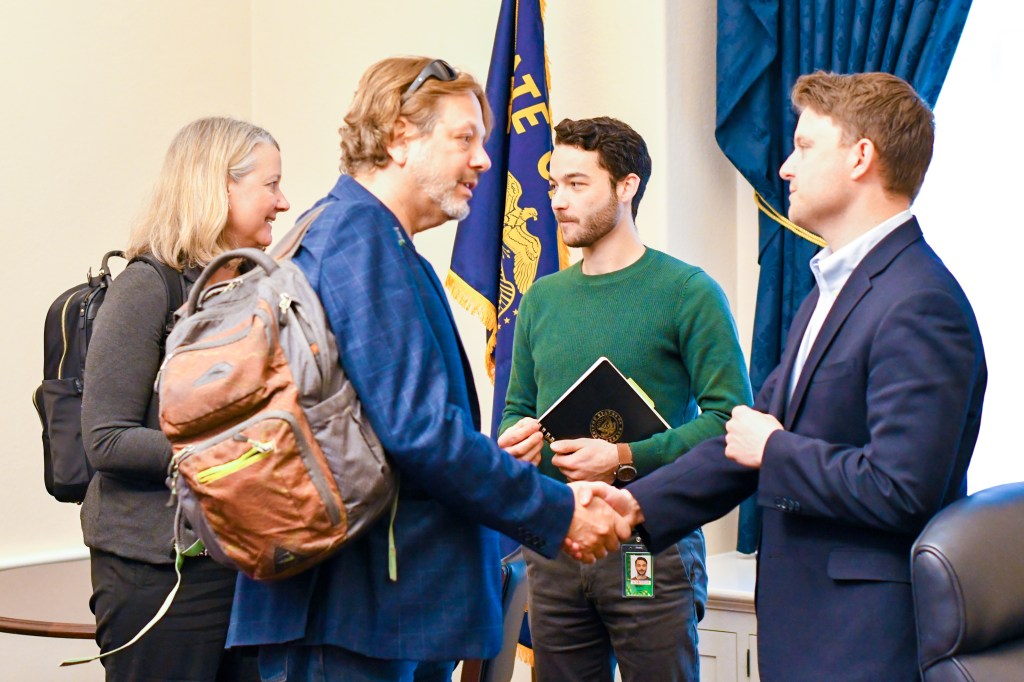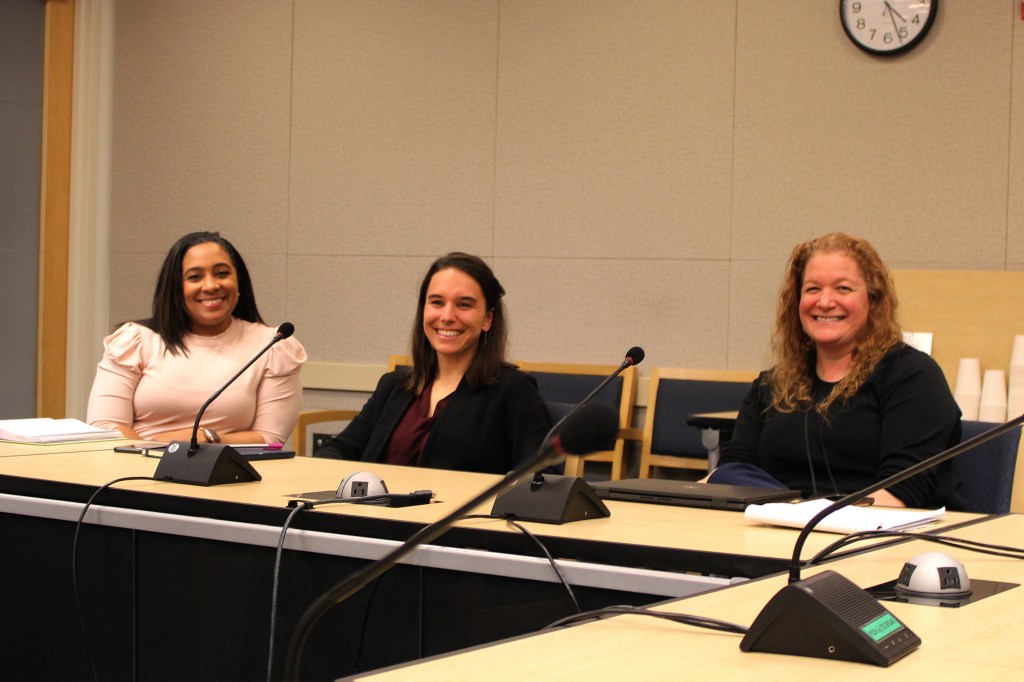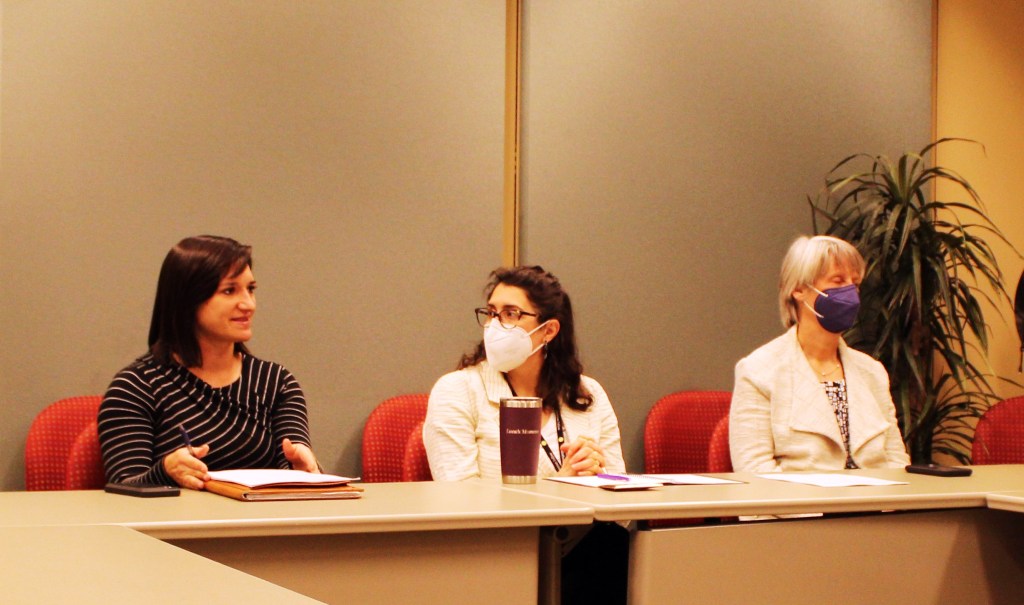By GSA Science Communication Fellow Laura Fattaruso
Have you ever wondered how you, as a scientist and GSA member, might be able to influence public policy? Scientists bring their expertise to bear on governance in many ways. Here’s a guide to some of the ways scientists are lending their expertise to public decision making, and how you can start to get involved in small ways, or maybe even pivot to a career as a scientist working in policy.

Dip your toe
For those seeking ways to get involved with policy without making it their full-time job, GSA provides some tools to help.
Stay Informed
GSA has position statements on a wide range of issues of relevance to the geoscience community—from flood risk management to visas for foreign scientists and students. These position statements are developed and revised by GSA’s Geology and Public Policy Committee, and any GSA member can propose a statement or revision.
With input from members, GSA has recently compiled two reports for the National Science Foundation—one focused on climate change solutions that can be implemented within a two- to three-year timeframe, and another report exploring the most pressing issues in “GeoHealth”—the impacts of changing natural environments on human health.
Voice your expertise to federal agencies
GSA Science Policy Fellow Christine Ray recently shared tips and strategies for providing input to Federal Agencies under the Executive Branch like the USDA, Department of the Interior, USGS, NASA, and the EPA. These agencies will sometimes ask for public comments—for example, NASA invited commentary on its Mars Sample Return environmental impact statement last November. Read Ray’s Speaking of Geoscience blog post to learn more about providing your expert opinions to federal agencies during their decision-making processes.
Visit Congress
Congressional visit days for scientists are organized by GSA’s Director for Geoscience Policy Kasey White every year, providing training and workshops for scientists about how to effectively communicate with members of Congress, followed by visits with members of Congress and office and committee staff members. This year’s Geosciences Congressional Visits Days will be on September 13-14, 2023.

Policy Toolkits
Exclusively available to GSA members, the policy toolkit contains short videos, longer webinars, and articles aimed at training scientists to effectively engage with lawmakers and stay up to date on current legislation. Resources include guidance on visiting representatives in DC or in your home district, how to draft effective “one-pager” documents on issues of particular interest to you, and guides for understanding the how the government operates, such as how the budget appropriations process works.
Dive into policy
Fellowships
For scientists considering a shift into a policy career, fellowships offer opportunities to spend one or more years working full time in government-facing roles.
GSA and the U.S. Geological Survey (USGS) jointly sponsor a Congressional Science Fellow each year through the American Association for the Advancement of Science’s Science and Technology Policy Fellowships program. The GSA-USGS Congressional Science Fellow spends a year working as a staff member for a member of Congress or congressional committee. The current Congressional Science fellow, Dr. Hannah Palmer, is a climate and environmental scientist working in the office of Senator Tammy Baldwin (D-WI) on issues related to energy, the environment, and agriculture.
GSA also selects a Science Policy Fellow each year to bring science and scientists into the policy process. The Science Policy Fellow attends congressional hearings and tracks geoscience-related legislation, with the aim to “bridge the gap” between policy makers and scientists. Current GSA Science Policy Fellow Christine Ray is keeping the geoscience community updated about her experience on Capitol Hill through posts on GSA’s Speaking of Geoscience blog, like this one about a roundtable discussion hosted by the White House Office of Science and Technology Policy to discuss issues of harassment in isolated scientific environments.
On 20 March, GSA’s Director for Geoscience Policy Kasey White led a field trip in conjunction with the 2023 Joint Southeastern & Northeastern Section Meeting to meet with scientists working full-time in Washington, DC to inform policy decisions. Field trip attendees met with scientists working in a variety of different advisory roles at the National Academies, the Congressional Research Service and the House Committee on Science, Space, and Technology. These visits highlighted some of the ways that scientists can bring their expertise to full-time careers in policy.

The National Academies
A nonprofit, non-governmental organization originally commissioned by the government to create consensus reports on scientific issues, the National Academies are composed three organizations: the National Academy of Sciences (NAS), National Academy of Engineering (NAE), and National Academy of Medicine (NAM).
The National Academy of Science was created in 1863 by an act of Congress with the mission to inform the public and government on scientific issues. This is accomplished by gathering committees of expert volunteers to write consensus reports on important scientific issues and offer recommendations for future priorities and directions. If you want to know what the scientific consensus on a topic is, a National Academies report may be the best place to go. Thousands of scientists volunteer with the Academies every year, so a great way to get involved is to look for opportunities to lend your expertise to a committee. While the panels of experts are volunteers, the employees who organize these panels are mostly scientists who have applied their backgrounds to these full-time careers in policy.

In addition to reports, the National Academies also organizes conversations and workshops. For example, one recent conversation series focused on improving accessibility and inclusion in field, laboratory, and computational science. An upcoming workshop, currently in the planning stages, will focus on tipping points and cascading impacts in Earth systems. These are just a small sample of the many critical issues the National Academies work to address.
Congressional Research Service
When a Member of Congress needs to understand a scientific issue and its impact on legislation, they turn to the Congressional Research Service (CRS). This agency, part of the Library of Congress, provides non-partisan reports and analyses to Congress while steering clear of opinion or recommendations. Products generated by the service can range from public reports to confidential briefings. Roughly four-hundred employees staff the CRS, with most having expertise in policy and law. Scientists generally serve through the Resources, Science and Industry Division of the service. In addition to providing reports about how legislation will impact specific issues, the CRS supports Congressional hearings by compiling relevant information and suggesting appropriate expert witnesses.

Until 2018, products and reports from the CRS were not shared with the public, but the Consolidated Appropriation Act of 2018 directed the agency to begin publicly sharing non-confidential reports. In addition to written reports, they also produce podcasts and webinars, and host in-person seminars. As an example of how the CRS brings science to bear on policy, one report from earlier this year examines how greenhouse gas emissions will be affected by the Inflation Reduction Act of 2022.
House and Senate Offices and Committees
In addition to serving in the personal office of Members of Congress, scientists may serve as staff on various Congressional committees that guide legislation and gather expert testimonies that inform policies. These committees are divided between service to the House of Representatives and the Senate. In the House, committees that scientists might lend their experience to include the Committee on Science, Space, and Technology, the Agriculture Committee, the Natural Resources Committee, and the Energy and Commerce Committee. In the Senate, scientists could serve on committees like the Agriculture, Nutrition, and Forestry Committee, the Commerce, Science and Transportation Committee, the Energy and Natural Resources Committee, and the Environment and Public Works Committee.

These committees can hold hearings about specific legislation, but also use hearings to gather information that will inform future legislation. Last December, the Senate Committee on Commerce, Science, and Transportation held a hearing about the state of Earth observation data, called ‘Landsat at 50 & the Future of U.S. Satellite-based Earth Observation’ with expert testimony from scientists from NOAA, NASA, and the USGS to discuss the history and future of earth observations from space. The House Committee on Science, Space, and Technology held a full committee hearing last year about ‘Building a Safer Antarctic Research Environment.’ Most hearings are open to the public and are recorded and publicly shared.
You can see what legislation committees are currently working on and see their schedule of hearings through the www.congress.gov website.
Whether you are looking to just get more informed, you want to share your expert opinions with policy-makers, or you’re considering a move to a full-time career as a scientist in policy, GSA has resources to help you along the way.
###